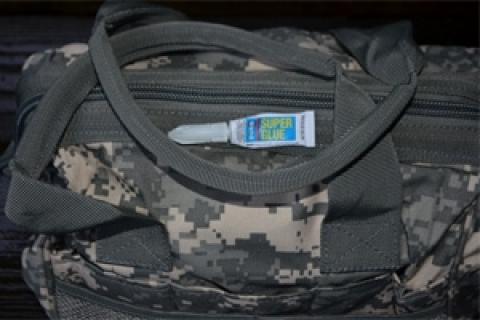
All 38 of us were bleeding; some suffered more serious wounds than others. The year was 1971. We were dug in on a mountainside on the Vietnam-Cambodian border. A five-hour night battle had just ended and our platoon needed medical attention badly.
 |
| Super glue is a must for the author's first aid kit, which can help patch up small cuts and nicks in a pinch. |
Medics attended to the worst cases first. "Let me look at your wounds, lieutenant," a baby-faced medic had said an hour after things had calmed down. "Nothing serious," I protested.
"I know," responded the medic. "I just want to clean and close them now before they get infected."
Water, peroxide and a pat dry and I thought I was done. But, the medic persisted. "Is that ?" I asked.
"Yep," came the reply. In a couple of minutes the medic had me glued back together and I continued my duties, with assurance that scars would not show up until I aged and my skin would begin to stretch.
I discovered the first scar on my face, on my lower right jaw, a couple of years ago. A small stick had stuck through my skin after a mortar had hit nearby. Two perfectly aligned scars marked my lower jaw.
That injury occurred over 40 years ago. I have packed super glue, or something similar, in my first aid kits ever since. On numerous occasions, I have closed small cuts and nicks on my hide as well as that of my hunting dogs. Most recently I closed a small cut on my left leg from chainsaw cut.
Such glues are not a good option for large cuts, however. The active chemical ingredient in superglue can irritate the skin and cause inflammation, especially the raw flesh of deep cuts. It requires so little glue for small nicks that it normally does not present a problem. There is a new, much more expensive medical glue on the market that is much less irritating.
Also, glue is not strong enough to hold gaping wounds. They should be closed with sutures, staples, butterfly bandages, duct tape or whatever tape is available. Small drops of super glue on the adjacent skin will help the tape stick better.
Make sure wounds are thoroughly cleaned before closing them. To do so without proper cleaning is to invite infection. A warm, wet environment will cause bacteria to multiply rapidly.
Every outdoorsman should cary a small first aid kit. Adding a tube or two of super glue will take very little space and it is relatively inexpensive. I religiously carry a larger first aid kit and have done so for decades. It has proven invaluable on many occasions. Most importantly, super glue has allowed me and hunting partners to continue hunts that otherwise wound have had to be ended because of small wounds and scrapes.
"What are you fussing about, lieutenant," the teenaged medic had asked.
"My hand is glued to the grip of my M-16," I snapped.
"Sounds like you are going to need it again real soon, sir!"
- 2847 views

